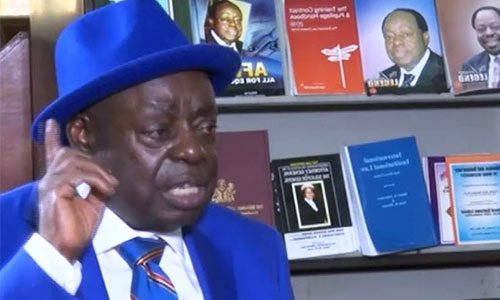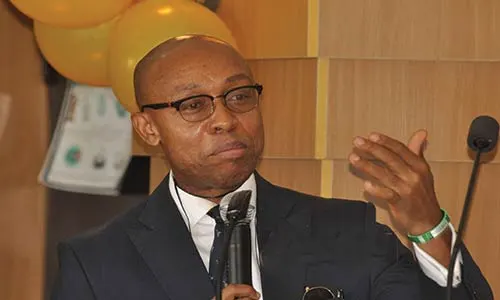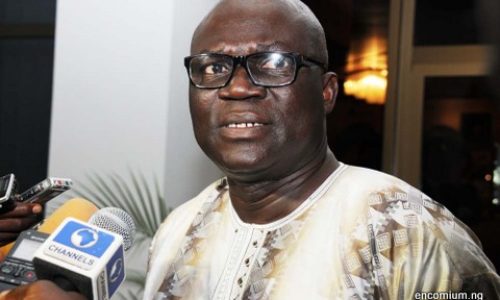The Judiciary Must Remain Independent (1)

THE judiciary is an indispensable arm of any constitutional democracy, and the existence of an effective judicial system is pivotal to the sustenance of the rule of law. A strong and independent judiciary plays a crucial role in the process of nation-building as the institutions of the state are premised on maintaining an equilibrium among competing interests between individuals and governments, and between governments themselves, and this role is fundamentally played by law as administered by the courts.
Thus, the courts, are the repository of the great responsibility and duty to ensure that justice is done, irrespective of any internal or external influence. In this regard, the courts dispense justice using the instrumentality of laws which are, by themselves, instruments of social engineering.
Before colonialism, the Nigerian indigenous judicial system had a measure of effectiveness and widespread acceptance by the people of the locality to whom it was administered. Each tribe had its own system and idea of administration of justice and to a large extent, the rights and obligations of their citizens were duly determined vis-à-vis their legal jurisprudence.
However, at the inception of colonialism, common law principles, the doctrines of equity, together with the statutes of general application which were in force in England and on or before January 1, 1900 were made applicable to Nigeria as a Colonial territory of England.
The implication of the application of the English laws to the Nigerian colony is that principles of law and equity as informed by the English traditional, political, social and economic conditions became applicable to Nigeria.
It is to be noted, however, that many of the English received laws are a reflection of the English class feudal structure. English judges who were appointed to administer law in Nigeria took due cognisance of the existing native laws and duly applied them to deserving cases, insofar as the native laws passed the repugnancy test.
The challenges in the administration of Justice: There is no doubt that the Nigerian judiciary and the effective administration of justice is riddled with several challenges. One of the most known challenges facing the administration of justice is the issue of delay in the court process.
William E. Gladstone popularly noted that “justice delayed is justice denied”. In many jurisdictions all over the world, timeliness and delay in the administration of justice are generally measured by gauging the time taken for a dispute to progress from the commencement point of filing or referral to resolution.
Delay in the speedy dispensation of justice is perhaps one of the reasons why some persons would resort to alternative methods of dispute resolution rather than approaching the courts to present their cases.
From the filing of court processes to preliminary objections, to appeal on interlocutory issues, to endless adjournments occasioned by ineptitude of counsel or unavailability of a judge, to delay tactics employed by some legal practitioners, and subsequent appeals to the appellate courts, it is without a doubt that litigants may spend several decades in ventilating their grievances in court. Most times, parties would die before their cases are concluded and while some cases may survive the parties, others simply abate upon the death of parties to it.
The independence of the judiciary is another major factor affecting the administration of justice in Nigeria. The advent of military rule in Nigeria greatly impacted the rather-delicate democratic structure. While the judiciary was the least affected by the military revolutions that occurred in Nigeria between January 15, 1966 and July 29, 1975, the independence of the judiciary under military rule was seriously undermined.
Military tribunals were set up which enforced draconian laws as a quick form of justice in most cases brought before them, thereby disregarding the due process of legal court proceedings. One of such is the tribunal set up under Decree No. 2 of 1984 State Security (Detention of Persons) which allowed indefinite detention on security grounds and empowered the Chief of Staff, Supreme Headquarters to detain any person found guilty of acts prejudicial to state security.
Political pressure and the erosion of judicial independence continues to play a major role in waning public confidence in the judicial process. The independence of the judiciary is often measured or described in relation to the amount of control (undue), inappropriate or illegal internal or external influence exerted over the judges.
While internal independence refers to the ability of judges to determine a case without undue regard to administrative hierarchies within the court, external independence, on the other hand, refers to the ability of judges to administer justice without interference from the elected members of government, administrative agencies or even the society.
Sometime ago, the clamour for judicial autonomy dovetailed into a long court strike by the Judiciary Staff Union of Nigeria, JUSUN, over the union’s demand for the financial autonomy of the judiciary at the state level.
It is rather unfortunate that it would take a prolonged closure of courts to drive home the point that the judiciary must be financially independent and despite signing the Memorandum of Action on the autonomy of the state judiciary, not all 36 states have passed the appropriate law for the autonomy of the judiciary.
Repeatedly, the Nigerian judiciary has experienced the unfortunate incidence of the invasion of the residential premises of judges. Back in 2016, the homes of some Supreme Court justices were searched by the officers of the Directorate of State Services and some of them arrested. It was also reported that the search led to the discovery of huge sums of money in local and foreign currency.
For a long time, arguments went back and forth from several quarters as to the proprietary of what seemed a brazen attack on the Nigerian judiciary. To date, there was no indictment of any of the Supreme Court justices whose premises were invaded nor did the invasion attract any consequence to justify it in the first place.
It therefore tells a discerning mind that it was no more than a mindless show of force with no endgame of attaining justice. Again, last year, there was a nationwide media report of the invasion of the residence of Honourable Justice Mary Peter-Odili consequent upon a Search Warrant issued by a FCT Chief Magistrate on the basis of “illegal activities suspected to prove to crime at No. 9, Imo Street, Maitama, Abuja”. The invasion was severely condemned from all quarters for being unconstitutional, illegal, and an affront to the entire judiciary.
In a press release, the Nigerian Bar Association noted that the invasion is “an affront on the Judiciary and grossly undermines the democracy that we profess to practice”. The House of Representatives Committee on Judiciary, in lending its voice to equally condemn the siege, reportedly stated as follows:
“The siege is reminiscent of the 2016 incident, where in the beat of the night, security agencies invaded private residences of judicial officers, which subsequently turned out as an underserved phenomenon, and a dent on our professed independence of the judiciary, and demanding protection for our judges”.
Next week, I will discuss the role of lawyers and litigants in shaping public perception to the administration of justice.



